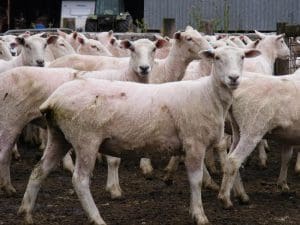
Maternal composite ewes at Kalangadoo in South Australia.
NEW sheep feeding standards for non-Merino or maternal ewes are expected to be finalised next year.
The national standards used to predict energy requirements and intake for sheep are being evaluated to improve the accuracy of on-farm economic predictions for sheep meat producers.
Meat & Livestock Australia is leading the research and development project addressing components of the Australian Feeding Standards for Ruminants (AFSR), the national standards which describe the nutrient requirements and the response of ruminants to changes in their feed supply.
The project is being undertaken in collaboration with Murdoch University, the South Australian Research and Development Institute and Agriculture Victoria at Hamilton.
MLA program manager – sheep R&D, Richard Apps, said the project would redefine key aspects of the AFSR related to intake capacity and energy use for non-Merino or maternal ewes.
“The AFSR in their current form were developed from Merino-based systems but don’t work for modern maternal genetics,” Mr Apps said.
“Lambs from non-Merino or maternal ewes are an important part of the sheep meat industry, accounting for about 40-45 percent of total lamb supply.
“The AFSR need to be redefined to accurately determine the economic optimum condition score profiles for a range of production systems,” he said.
“The new feeding standards we’re working on will be a long-term enabling tool for the sheep industry when doing on-farm modelling to help boost productivity and profitability.”
Mr Apps said the project would complete R&D work already undertaken by MLA through the Lifetime Maternals project, which developed management guidelines for non-Merino ewes, aimed at lifting lamb survival, weaning rates and kilograms of lamb produced per hectare in maternal ewe flocks.
He said some of the findings of the Lifetime Maternals project highlighted the need to redefine AFSR.
“The Lifetime Maternals project successfully generated production responses related to changes in liveweight and condition score of maternal ewes during pregnancy and feed-on-offer during lambing and lactation to lamb birth weights, weaning weights and survival, and carry-over ewe reproduction in a range of environments,” Mr Apps said.
“Whole-farm systems modelling using these production responses indicated that farm profitability is very sensitive to condition score profile in sheep. However, the development of economically optimum condition score profile targets for maternal ewes was prevented by a discrepancy between changes in liveweight predicted using AFSR and the actual measured changes in ewe liveweight.
“The high rates of liveweight gain measured could not be adequately represented in the models because the predicted intakes were too low and the predicted energy requirements for maintenance or weight gain were too high,” he said.
“Further modelling highlighted the importance of each component of the intake and energy equations in determining the economic optimum condition score profiles for maternal ewes.”
Lead researcher of the projects, Dr Andrew Thompson, from Murdoch University, said the redefined predictions, once completed, would enable whole-farm economic modelling to develop optimal management recommendations.
“The management recommendations will then be incorporated into new sheep industry extension and adoption programs, as well as existing programs such as Bred Well Fed Well, Profitable Grazing Systems and LifeTime Ewe Management,” Dr Thompson said.
The new LifeTime Maternals tools are expected to be available to the sheep industry by the end of 2018.
Source: MLA.



Sorry, my comment should have read – In other words the advice we have been given for the last ten years for non-Merino sheep was wrong.
Standards? What standards? Is this just poor use of terminology or is there a suggested introduction of feeding standards as industry practise?